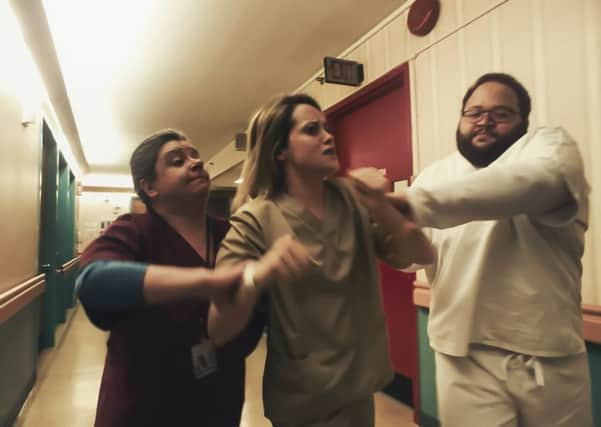Film reviews: Unsane | Mark Felt | The Third Murder | Have a Nice Day | Here to be Heard


Unsane (15) ****
Mark Felt: The Man Who Brought Down the White House (12A) **
The Third Murder (15) ***
Have a Nice Day (15) ***
Here to be Heard: The Story of the Slits (no cert) **
Echoes of Shock Corridor reverberate around Unsane, Steven Soderbergh’s delirious exploitation thriller about a young woman (Claire Foy) who finds herself unwittingly committed to a mental health treatment centre. As in the aforementioned Sam Fuller classic, the asylum setting serves as a juicy metaphor for what it’s like to exist in a world gone mad and Soderbergh – always an envelope-pushing director when it comes to experimenting with technology, form and content – amps up the paranoia by shooting the whole thing on an iPhone 7, making the most of the smartphone’s cinematic limitations to convey the distorted, nightmarish reality of living at a time when nothing seems to make sense. It’s one of the film’s grim jokes that after attending what she thinks is a routine therapy session, troubled financial analyst Sawyer Valentini (Foy) signs away her freedom with the sort of casualness one might display when checking the terms and conditions waiver on a new software upgrade. As her hitherto unimaginable new reality quickly dawns on her she makes her case worse by lashing out at doctors, nurses and other patients as she tries to make it clear she doesn’t belong here. Is her perspective to be trusted? Soderbergh – working from a script by James Greer and Jonathan Bernstein – keeps that element ambiguous, at least for a while, building in layers of intrigue with an opening act that sends out all kinds of weird signals, especially when a Tinder hook-up takes a turn for the bizarre. Once inside the hospital, things get even more wild as further reveals about her past alter our perception of her sanity while reflecting the hideous reality of a world in which abuse is allowed to flourish unchecked. Though a MacGuffin that riffs on the medical industry musings at the heart of Soderbergh’s earlier film Side Effects gives the whole thing a neat structure (albeit one that perhaps doesn’t bear too much scrutiny), it’s another plot twist that turns the film into a blunt, scary, intentionally lurid exploration of gender politics and power dynamics, making it feel thoroughly of the moment. Foy really gets to stretch herself here as a woman backed into a corner but unwilling to play the victim. Soderbergh, meanwhile, revels in the digital challenge of exploiting new technology to craft a social horror film that examines how that very technology can be both beneficial and catastrophic to our wellbeing.
Advertisement
Hide AdIt’s too bad the clumsily titled Mark Felt: The Man Who Brought Down the White House didn’t have a similarly inspired approach to its subject. A biopic of the former FBI Associate Director turned whistleblower Mark Felt, a man destined to be known forever by his Watergate alias Deep Throat, it sketches out yet another part of the Nixon downfall story previously dramatised in All the President’s Men and, more recently, in Steven Spielberg’s The Post. Unlike those films, there’s no cinematic flair here; as the title indicates, it’s very much a spell-everything-out affair with a craggy faced Liam Neeson playing Felt as a loyal career agent who started talking to the Washington Post when it became clear his new boss was all too willing to be a puppet of the Nixon administration during the investigation into the Watergate burglary. Sadly Neeson’s doggedness in the role can’t save it from journalist-turned-writer/director Peter Landseman’s sludgy approach, which confuses sombreness with gravitas. The story’s accidental timeliness may generate some interest, but the film kills it pretty swiftly.
Better known for beautifully sketched family dramas such as Nobody Knows and, more recently, the wonderful Our Little Sister, Japanese master Hirokazu Koreeda changes tack with The Third Murder, a slow-burning crime procedural that quietly rails against Japan’s continued use of capital punishment. When an ageing ex-con (Kôji Yakusho) is arrested for the murder of his boss, a young state defender starts to doubt the validity of the confession as inconsistencies in the case arise and the accused’s complicated relationship with his alleged victim’s family – especially his relationship with his boss’s daughter – comes to light. Koreeda keeps his cards close to his chest, letting his antagonist’s own conflicting accounts of the murder obscure the truth, Rashomon-style, further undermining the finality of a justice system with no room for human error. Though meandering in places, it makes its points forcefully enough.
A bag of stolen cash is the common factor linking four tales of woe in the ironically titled Have a Nice Day, an animated gangster drama set in modern day China that manages to pack an absorbingly convoluted plot into its brief 75-minute running time. The four stories, which eventually converge, paint a pitiable view of life in the new capitalist age, with director Liu Jian’s deceptively basic visuals reinforcing the rich seam of corruption and unhappiness bubbling away just beneath the surface.
Appropriately shambolic in style, Here to Be Heard: The Story of the Slits pieces together the history of the pioneering all-girl punk group with some great, rabble-rousing tales of defiance. Sadly there’s also too little journalistic nous on display to make a solid case for the band’s legacy and too little storytelling skill to make its second-half focus on late front-woman Ari Up’s determination to reform the band in the early 2000s dramatically interesting. The end result feels a bit broken-backed. ■